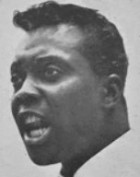
B-side on Leedon, May 1963, a double-sided hit with the A-side, You’ll Never Cherish A Love So True (Until You Lose It).
Johnny O’Keefe (1935-1978) was Australia’s biggest star of the rock’n’roll era, known as The Wild One, The King of Rock’n’Roll or just J. O’K.
His better known songs include The Wild One (1958), So Tough (1958), Sing (1962), She Wears My Ring (1964), and Mockingbird (1973, with Margaret McLaren).
Browse other J. O’K songs at this website.
Further reading: Damian Johnstone’s definitive J.O’K. biography The Wild One, 2001 (Google Books).
 Single on Vee Jay December 1962.
Single on Vee Jay December 1962.
Gil Hamilton (b.1941) became better known as Johnny Thunder, the name on his #4 USA hit Loop De Loop (1963). As Gil Hamilton, he recorded Tell Her (1962), the original version of Tell Him, a hit for The Exciters (1962, #4 USA).
Matt Maurer & Wes Farrell collaborated on a number of songs. The B-side of Move & Groove is a Maurer-Farrell composition with Gil Hamilton, When Are You Coming Home.
Wes Farrell (1939-1996) was a producer, arranger, publisher and label owner who also released some records in his own name in the 60s. Songs he co-wrote include Boys (Shirelles, Beatles); Come A Little Bit Closer (Jay & The Americans); Come On Down To My Boat (Every Mother's Son); Hang On Sloopy (McCoys); Baby Let Me Take You Home (Animals).
 Further reading: 1. Johnny Thunder (Gil Hamilton) biography at All Music Guide. 2. Wes Farrell at Wikipedia. 3. Interview with Wes Farrell at CmonGetHappy.com, a Partridge Family fansite: Farrell produced the show's music.
Further reading: 1. Johnny Thunder (Gil Hamilton) biography at All Music Guide. 2. Wes Farrell at Wikipedia. 3. Interview with Wes Farrell at CmonGetHappy.com, a Partridge Family fansite: Farrell produced the show's music.
Thanks to mp3z2cd.
B-side on Fairmount, September 1963 (a few months after Johnny O'Keefe's version).
R&B-jazz-gospel-pop singer and keyboardist Frankie Brunson (1929-2007) was from Buffallo NY. He was also known as Little Frankie Brunson, and he released some records as Big Daddy in the late 50s.
Frank Brunson sang with jazz group The Lynn Hope Quintet in the early 50s, and was a member of The Fashions1 in the late 50s into the 60s.
With some former members of The Fashions he later formed the funk-disco band The People's Choice. They had two Billboard Top 40 singles, I Likes To Do It (1971, #38 USA) and Do It Any Way You Wanna (1975, #11 USA).
Brunson is an inductee of the Buffallo Music Hall of fame.
Footnote: 1. Not Frankie and the Fashions, led by Frankie Lafaro.
References: 1. Frankie Brunson discography at SoulfulKindaMusic.net. 2. Frank Brunson biography at Uncrowned Community Builders. 3. The People's Choice (band) at Wikipedia.
Thanks to mp3z2cd.
SAME TITLE BUT NOT THE SAME SONG AS
'MOVE BABY MOVE' BY JOHNNY O'KEEFE.
Single on Savoy by R&B singer formerly in early 50s vocal group The Four Buddies.
Larry Harrison may be better known as a songwriter, often with Jimmy Williams, for example on Nancy Wilson's (You Don't Know) How Glad I Am (1964, #11 USA). Clyde Otis was the producer and writer behind many of Brook Benton's hits.
Clyde Otis & Kelly Owens wrote, for example, Nat King Cole's That's All There Is To That (1956, #16 USA).
![]()
SAME TITLE BUT NOT THE SAME SONG AS
'MOVE BABY MOVE' BY JOHNNY O'KEEFE.
Single on Sun, a song in the vein of Shake, Rattle And Roll by versatile singer-songwriter-keyboardist who was signed to Sun after working with Ike Turner.
Further reading: Billy Emerson biography by Bill Dahl from Music Guide [archived page].
SAME TITLE BUT NOT THE SAME SONG AS
'MOVE BABY MOVE' BY JOHNNY O'KEEFE.
Unreleased Sun recording. (Audio sample at RCS).
SAME TITLE BUT NOT THE SAME SONG AS
'MOVE BABY MOVE' BY JOHNNY O'KEEFE.
Single on Christy that pre-dates the copyright registration of Maurer & Farrell's Move And Groove at US Copyright Office.
Al seems to have been blues singer Al King, real name Alvin K. Smith (1923-1999).
As Eugene Chadbourne points out at AMG, Telling these guys named Al King apart is like looking for a specific dune in the desert. Other sources (including AMG) will tell you that that Al King/Alvin K. Smith was born in 1926 and ended up with a biography that merely intersects at some points with that of Al King/Alvin K. Smith (1923-1999). I'll go with the reference below, which at least mentions Nettie in passing.
Reference: Edward M. Komara, Encyclopedia of the Blues, 2006 (Google Books)